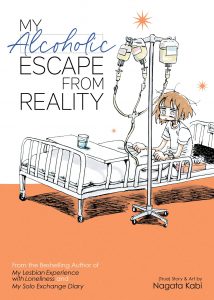Amazon Affiliate Link | Bookshop.org Affiliate Link
Nagata Kabi is back with My Alcoholic Escape From Reality! The mangaka behind My Lesbian Experience With Loneliness and My Solo Exchange Diary returns with another memoir, this time about being hospitalised for acute pacreatis resulting from her alcoholism.
My Alcoholic Escape From Reality feels a lot more like a diary comic than any of her previous works. The art style hasn’t changed, although the monochrome colour scheme has shifted to orange now, but the manga as a whole feels tonally lighter and more consistent. I assume that this is a side-effect of it being written as one piece rather than a collection, but I’m willing to be convinced otherwise. Despite the lighter tone, the frankness that she has in her previous books continues here. She is very open about her alcoholism and her depression, neither of which is resolved by the end of the book. She’s not a perfect patient by her own admission – she relapses, she gets angry about the restrictions on her life, she lies to her doctors – and she’s very explicit about her understanding of what would make a satisfying narrative about her experience and how it compares to what she’s living. They way Nagata Kabi personifies and visualises her conditions is more emotive than medical, which works great and stops the entire manga being medical professionals explaining things. There is still a lot of medical details involved – if you, like me, have no idea what pancreatis is, look forward to being educated! But the explanations aren’t overwhelming, which I appreciated.
One of the threads of My Alcoholic Escape From Reality is creating while dealing with not only serious medical conditions but also guilt about her work. She feels guilt for creating memoir at all, and for enjoying it when she knows how negatively her family feels about her work. (Her compromise seems to have been only involving them in the most surface-level scenes, rather than delving back into her feelings about them.) The realisations she goes through about her work and what it means to her to do that work is lovely to read.
My general recommendation for Nagata Kabi’s memoirs are that they’re good in the same way that Hannah Gadsby’s Nanette is good. They are both queer creators using their most raw edges and pain as entertainment, and cast an uncomfortable reflection back on the audience consuming that entertainment (… and the reviewer rating how well they depicted that pain, yes, please enjoy the mental knots I tie myself into). They are both funny and insightful, and that humour only makes their more serious points hit like a train. This ties into the point Nagata Kabi makes about narrative satisfaction – as a story, the most satisfying endings are the ones where she either relapses or recovers, and life isn’t that tidy; instead, it’s a narrative in progress, where she’s trying to be well and at least writing herself a smidge of hope for the future, and I respect that a lot.
If you want an untidy memoir told with Nagata Kabi’s usual bluntness and humour, I’d definitely recommend picking this up.
Content warnings: alcoholism, depression, hospitalisation and medical treatment
Susan is a library assistant who uses her insider access to keep her shelves and to-read list permanently overflowing. She can usually be found as a contributing editor for Hugo-winning media blog Lady Business, or a reviewing for SFF Reviews and Smart Bitches Trashy Books. She brings the tweets and shouting on twitter.

